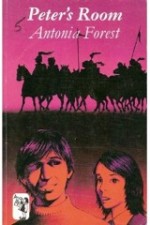Writers Write: My Favourite Book 12
Kate Constable
Kate is the author of the much loved ‘The Chanters of Tremaris’ series.
There is a very particular thrill in discovering a book that seems to have been written just for you and nobody else in the world. When I first read Peter’s Room in my early teens, I felt a shock of recognition, and a secret delight so strong that it seemed almost wicked.
The book belonged to my school library, so I could borrow it whenever I wanted to. I didn’t realise how rare and unfashionable all Antonia Forest’s books were to become, or I might have stolen it on my last day. No, seriously. They are almost impossible to find now. You can imagine my joy when, many years later, I actually found another copy — not even in a secondhand bookshop, but with a stack of old paperbacks in a Spanish restaurant in Collingwood. Dear reader, I bought it for three dollars. The cheapest copy I could find on the internet this morning cost fifty seven pounds!
Antonia Forest was an English author, who wrote a series of ten (in my view) criminally under-appreciated school stories and other books featuring the improbably large Marlow family. The first book, Autumn Term, was written in 1948; the last in the series was published in 1982. Slightly weirdly, though the action in the books takes place over only a couple of years in the life of the Marlows, each volume is updated, more or less, to the year in which it was written, so that characters who remember living through the Blitz in the first book are toying with punk by the last. This can make for a disorienting reading experience if you read the series all the way through!
Peter’s Room falls in the middle of the series, and is set during the Christmas holidays at the Marlows’ ancestral farm estate, Trennels. Peter takes possession of the Shippen, a disused outbuilding, and the four younger Marlows, together with their neighbour Patrick Merrick, gather there to create their own version of the Bronte sisters’ invented sagas of Gondal and Angria.
Each of them takes on a character — the young king Jason, Malise, Nicholas, Crispian, Rupert — you can sense the courtly, high romantic flavour of the fantasy by the names they choose! And while developing their joint story, each takes the chance to use their character to express some hidden side of their own personality. Patrick decides, to the outrage of the others, that his Rupert will be a traitor, unable to stand up to the htreat of torture. Nicola, though the most reluctant participant, finds comfort in her Gondal character when she finds her beloved hawk dead on his perch. Ginty and Patrick begin a tentative romance under cover of privately ‘being’ Rupert and Rosina. Lawrie, the actress of the family, relishes the acting-out and is dismayed when the experiment falls apart. And Peter comes to identify so strongly with Malise that it almost costs him his life.
When I first read Peter’s Room, I was the only person I knew of with a strong, private fantasy life, and this was the only book I’d ever come across that captured the intoxicating, secret pleasure of becoming totally absorbed in your own imagined world. Interestingly, it was only on rereading as an adult that I fully absorbed the clear message of the book, that such role-playing and living in one’s imagination is self-indulgent, childish, and dangerous — both physically and emotionally. A message I somehow managed to miss the first time around!
What is going on here? As a writer, I now see myself as a professional daydreamer, and surely Antonia Forest herself was one too. After all, she wrote about the same cast of characters for over thirty years — she must have lived with them, spoken their thoughts, known them better than she knew herself. And Forest’s characters are wonderful — psychologically complex, flawed, attractive, maddening. Don’t tell me she didn’t live in an imaginary world! In real life, she was an only child, fascinated by large families. Were the Marlows the family she’d invented to keep herself company? I can’t help believing that someone who could write so convincingly and with such insight into the attractions of fantasising, knew first-hand how seductive those delights could be. Perhaps she feared being sucked in too deep, as the Marlows are; perhaps she knew exactly what that felt like. I guess we’ll never know (Antonia Forest died in 2003).
Anyway, Peter’s Room was my first evidence that other people knew about real imagining — imagining so hard that it felt as if that was your true life, not getting up and brushing your teeth and going to school; knowing that your ‘pretend’ self was your real self, not the dull everyday person that everyone else saw. It was the first time I’d felt really, secretly, wholly understood. It was written just for me.
Kate’s latest book is Crow Country (Allen & Unwin 2011). For more, visit her blog at http://kateconstable.blogspot.com/


They sound like fascinating books, the same family placed in different decades. This book sounds so appealing and interesting. I looked at this post and, like I normally do with long things on the internet, sighed but it read easily. 🙂